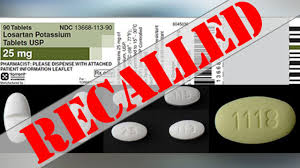
DiYES International School – Blood Pressure Medication safety is once again under scrutiny after nearly 581,000 bottles of prazosin hydrochloride capsules were recalled across the United States. Teva Pharmaceuticals announced a voluntary recall on October 7 following laboratory tests that found elevated levels of N-nitroso prazosin, a chemical impurity linked to cancer. The FDA classified the recall as a Class II risk on October 24, signaling potential for medically reversible side effects or a remote chance of serious harm. The affected lots include 1 mg, 2 mg, and 5 mg capsules distributed nationwide, primarily prescribed for hypertension and certain prostate conditions. Some physicians also prescribe this medication off-label to treat PTSD-related symptoms. Health experts have urged patients not to stop taking the medication abruptly but to consult their healthcare providers immediately. This massive recall has reignited public anxiety about drug contamination and pharmaceutical oversight in the United States.
Teva Pharmaceuticals initiated the recall after internal testing revealed that the Blood Pressure Medication contained impurity levels exceeding safety standards. The impurity, known as N-nitroso prazosin, belongs to a class of nitrosamines that have been associated with increased cancer risk when consumed over long periods. While trace amounts of nitrosamines can appear in many medications, the levels detected in certain prazosin lots surpassed acceptable thresholds established by global health authorities. Teva distributed these capsules nationwide, and the FDA quickly moved to classify the incident under its second-highest alert level. Public health officials have expressed concern over how long the contaminated products remained in circulation before detection. Although the recall is voluntary, the company has committed to retrieving the affected products and notifying distributors and pharmacies. Patients are strongly advised to review their prescriptions and check their lot numbers to avoid potential exposure.
“Read about: COVID News! US Health Agency Axes Official Who Dared to Oppose mRNA Shots!”
The recall includes three major dosage strengths, affecting hundreds of thousands of bottles of Blood Pressure Medication distributed across pharmacies and hospitals nationwide. Teva Pharmaceuticals listed 181,659 bottles of the 1 mg capsules, 291,512 bottles of the 2 mg capsules, and 107,673 bottles of the 5 mg capsules as contaminated. Each batch shows elevated impurity levels that raise serious health concerns. Expiration dates stretch from October 2025 through mid-2026, giving these drugs a long shelf life if not removed promptly. Pharmacists use specific NDC codes and lot numbers to locate the affected products and pull them from circulation. The FDA warns that extended exposure to high concentrations of nitrosamines could elevate the risk of cancer. This recall underscores the immense pressure on regulators to oversee massive pharmaceutical supply chains and ensure every product meets safety standards despite growing manufacturing complexity worldwide.
Patients currently using the recalled Blood Pressure Medication should contact their doctors before making any changes to their treatment. Stopping blood pressure medication suddenly can trigger dangerous spikes that increase the risk of heart attack or stroke. Healthcare professionals advise patients to schedule consultations and discuss safe alternatives or replacement prescriptions. Teva Pharmaceuticals contacted wholesalers and pharmacies directly, providing instructions for product returns and replacements. Pharmacists help patients verify their bottles by checking labels for specific NDC codes and expiration dates. Consumers who feel unsure about their medication can bring it to local pharmacies for confirmation. Public health agencies remind doctors to check their patient records for anyone prescribed prazosin hydrochloride and to share recall information promptly. Patients who act quickly and stay informed can reduce the risk of complications and protect their health more effectively during this recall.
The Blood Pressure Medication recall has reignited debate about pharmaceutical manufacturing oversight and the reliability of global supply chains. Many patients have expressed frustration and concern, questioning how contamination on such a scale could occur in the first place. Industry analysts point out that increasing outsourcing of drug components has created vulnerabilities in production monitoring. Critics argue that recalls of this magnitude erode public trust in pharmaceutical brands, while supporters of the industry emphasize that voluntary recalls show transparency and accountability. Health advocates have urged the FDA to strengthen testing standards for nitrosamine impurities and conduct more frequent audits of manufacturers. Meanwhile, Teva faces mounting pressure to rebuild confidence among doctors and patients alike. The recall serves as a sobering reminder that even routine medications require strict vigilance to ensure safety and maintain public trust in the healthcare system.
This article is sourced from kare11 and for more details you can read at diyesinternational
Writer: Sarah Azhari
Editor: Anisa